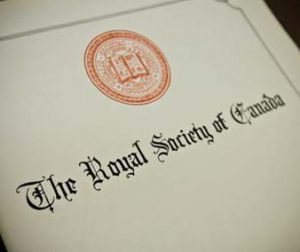 13 academics named, far surpassing any other university in the country
13 academics named, far surpassing any other university in the country
By McGill Reporter Staff
A whopping 13 McGill professors have been named Fellows of the Royal Society of Canada in the Society’s annual naming of new Fellows.
“It is truly special to see so many McGillians inducted at once,” said Sandra Crocker, Assistant Vice-Principal, Research and International Relations. “This exceeds, by far, all previous years.”
Crocker’s enthusiasm is all the more vibrant given that her boss, interim Vice-Principal Research and International Relations Rima Rozen is among those honoured as new Fellows of the Society.
“This is a very welcome honour,” Rozen said. “I am very grateful to have been named to this prestigious body, which is dedicated to the advancement of research and learning in Canada, but I am especially pleased with the recognition of so many of my colleagues at McGill.”
No other Canadian university came close to McGill in Royal Society Fellow nominations this year. The University of Toronto and the University of British Columbia had six each.
Rozen, internationally recognized for her work on the genetics of several disorders, including birth defects, heart disease and inborn errors of metabolism, joins an even dozen McGill colleagues in entering the Society. They are:
Christine Ross, Professor and James McGill Chair in Contemporary Art History in the Department of Art History and Communication Studies. She has recently published The Aesthetics of Disengagement (2006) and co-edited Disengagement (2006) and Precarious Visualities (2008). Her book on Passages of Time in Contemporary Art will be published in 2011.
Lydia White, a pioneering scholar in Linguistics and the James McGill Professor of Linguisitcs, is internationally recognized in the field of generative second-language acquisition. Her work has resulted in a new research framework, guided by the hypothesis that second-language acquisition can be explained in terms of a combination of the operation of universal linguistic principles and mother-tongue influence.
Robin Yates, a History professor who is an internationally recognized leader in the study of China, has produced ground- breaking scholarship on many aspects of its cultural history, including military science and technology has made major contributions to re- contextualizing Chinese thought, social institutions, and cultural practices.
Diane Desrosiers-Bonin, holder of a James McGill Research Chair in Renaissance Studies, teaches 16th-century French literature. As president of the Société internationale d’histoire de la rhétorique, she organized the society’s 17th biennial conference in Montreal last year. Her research focuses on pre-Calvinist reformers in France as well as feminine rhetoric in the 16th and 17th centuries.
Colin Chapman, a leading Canadian figure in tropical ecology and conservation. Given the plight that primates have suffered as a result of deforestation and hunting, he has focused his research and conservation efforts on primates. He is a research associate of the Wildlife Conservation Society, an honorary lecturer at Mekere University in Uganda, and has been instrumental in funding and maintaining the Makerere University Biological Field Station.
Russell Davidson, an Economics Professor, has contributed to developing rigorous statistical tests of economic models, which he has applied to analyzing income distribution. He has worked on both the theory and practice of the statistical technique known as the bootstrap.
Alain Pinsonneault, a world-renowned scientific leader in the study of information technologies and organizations. Solidly anchored in management and psychology, his research examines how information technologies change the work of managers, structures of organizations and group dynamics and how they create new forms of organizations – specifically, virtual teams and organizations.
Tho Le-Ngoc, nationally and internationally recognized as an outstanding researcher who has made several pioneering contributions in developing and demonstrating advanced transmission and resource allocation techniques for broadband access communications.
Siegfried Hekimi, a Professor of Molecular Biology and Genetics, has advanced our understanding of the causes of animal aging, in particular by discovering and studying long-lived mutants and using them to test theories of aging. For example, his work suggests that free radicals might not be the cause of aging, in contrast to what was previously widely believed.
Barbara Jones, from the Department of Neurology and Neurosurgery at the Montreal Neurological Institute, is known worldwide for her life’s work elucidating the basic mechanisms of sleep-wake states. She has delineated by their chemical neurotransmitters, neuroanatomical projections and discharge properties the major neural systems that generate the three distinct states, of waking, slow-wave sleep and rapid eye movement (REM) sleep.
Michel Loreau, a professor of Animal and Plant Biology, has made fundamental contributions to our understanding of biodiversity, ecosystem functioning, and the interactions between them. He is developing a synthetic ecological theory linking the microscopic dynamics of populations with the macroscopic dynamics of ecosystems.
Mark Sutton, a Physics professor, uses X-ray diffraction to study the time-dependent behaviour of materials. Using the new synchrotron X-ray sources, he has developed new methods to perform measurements that probe matter on nanometre length scales and with millisecond time resolution.
